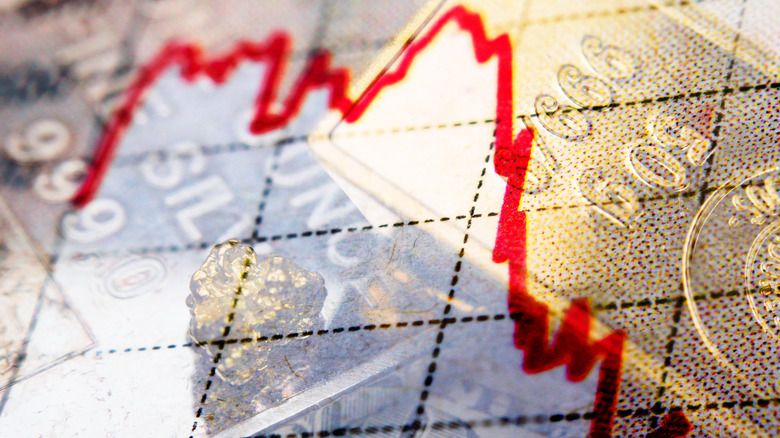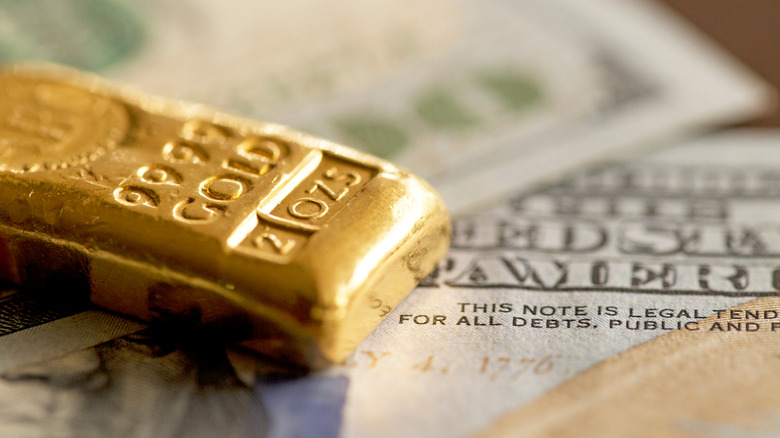The Real Reason The US Abandoned The Gold Standard
Gold has been used as a medium of exchange for thousands of years. The ancient Lydians first coined it in western Anatolia and the world's mints have been using it for coins ever since (via Fleur de Coin). This was a pretty good system because the coin's value was directly tied to its composition. It becomes a problem when we have to move lots of money. Gold is heavy and transporting a lot of it is difficult both in terms of the work required to move it and the security required to ensure it's not stolen.
The Chinese were the first to solve this problem when they began issuing paper money in the 11th century (via Guinness World Records). The basic idea was that the paper was a receipt for gold deposited with either a bank or the state, and whoever had this note from the bank (a banknote if you will) could exchange it for the gold on deposit, or spend it in lieu of the gold.
For hundreds of years, this was the foundation of the world financial system. Governments held vast reserves of gold to guarantee the value of their money. Until 1933, it was possible to exchange paper money for gold with the U.S. government.
Why can't I buy gold from the US government now?
The worldwide standard of using gold as the foundation of all financial exchanges was abandoned for two reasons: World War I, and the Great Depression. War is expensive and a war on the scale of WWI had never been fought before. Countries could not simultaneously finance their wars with gold, pay their citizens with paper money, and guarantee the money they were printing with the gold they were spending. This was the end of the British and German gold standards (via Investopedia).
Due to not having a war fought on its soil, the U.S. gold standard persisted and managed to resurrect the gold standards in many other places as well. This put the U.S. at the center of the financial world but this asset soon turned into a liability. The U.S. had tied its hands by linking its money supply to its gold supply, and when the economy began to destabilize after 1929, it didn't have the ability to stimulate its economy, exacerbating the Great Depression, and hastening the end of the gold standard.
The ghost of the gold standard persisted for a few more years in the form of the Bretton Woods system. This was the post-WWII realignment of Western currencies to be valued based on the dollar. The Bretton Woods agreement allowed nations to exchange their dollar reserves for gold. This system (and by extension the gold standard) was ended by Richard Nixon in 1971 amid the Vietnam War and rapidly declining gold reserves.
Why don't we return to the gold standard?
Every few years a politician or celebrity (sometimes they're the same thing) says we should go back to the gold standard. The basic argument is, without a limit on the ability to create money, the government has become too profligate in its spending, driving the economy into the ground. A return to the gold standard would be a return to fiscal responsibility and financial stability (via The Conversation).
This is true during times of peace and prosperity. The golden age of the gold standard was between 1871 and 1914 — the peace between the Franco-Prussian War and WWI when the economy of Europe exploded and countries bandied words instead of artillery shells. But as that peace evaporated, all of Europe abandoned the rigidity of the gold standard to instead pursue flexibility.
It's that rigidity that keeps nations from returning to gold. It's not possible to control how much gold is available in the world, therefore, if a country needs to produce cash to avoid an economic catastrophe (as in 2009), its hands can't be tied to how much gold it has. Finally, the U.S. has about $11 billion in gold reserves, according to the Bureau of the Fiscal Service. But, according to CNBC, the value of cash currently circulating is over $2 trillion, meaning we don't have enough gold to cover the currency that's already out there. So don't hold your breath for a return to the gold standard.


